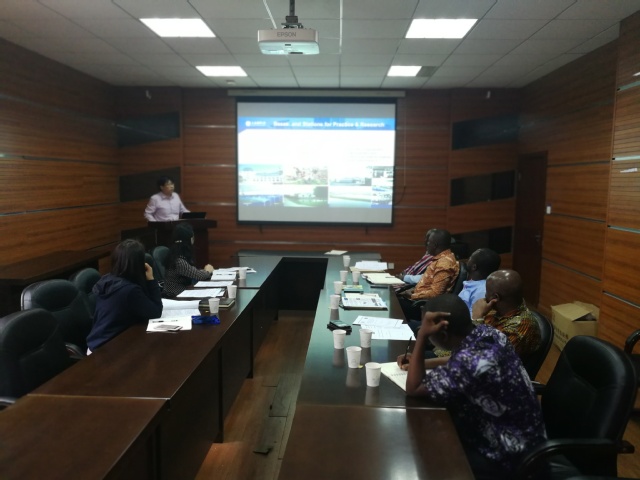On October 10, the College of Fisheries and Life Science of SHOU and the College of Renewable Biological Resources of Ghana University for Development Studies reached a consensus on launching the 2+2 cooperation program for cultivating undergraduate aquaculture majors. This marked an important step taken by the undergraduate specialty of aquaculture of SHOU on the path of internationalization, and laid a solid basis for strengthening the influence of the aquaculture education of SHOU in Africa.

Ghana is a Western African country located on the north bank of the Gulf of Guinea, adjoining Cote d’Ivoire in the west, Burkina Faso in the north, Togo in the east and the Atlantic Ocean in the south. Among Western African countries, Ghana is relatively economically advanced, based on agriculture and has rich water resources, but its aquaculture technologies and industries are backward and there is a shortage of aquaculture technicians. China is a powerful country in the aquaculture industry, and its aquaculture yield accounts for above 60% of the total aquaculture yield of the world. The aquaculture specialty of SHOU has a long-standing history, and a high reputation both at home and abroad. To respond to the Belt and Road Initiative of the country, SHOU began to consult with Ghana in 2016, and, after two years of negotiation and communication, the two sides spent a lot of energy and time in the cultivation program design, course syllabuses, qualified student selection and other aspects of the “2+2” cooperation program for cultivating undergraduate aquaculture majors, and eventually completed the confirmation of all technical details. According to the agreement of this program, the freshmen of Ghana University for Development Studies, after entrance, also need to register in SHOU. After the first two years of basic course education in Ghana, the students deemed as qualified by both parties will study the last two years of specialty courses in the undergraduate specialty of aquaculture. This program is the first “overseas student-welcoming” joint training program in the undergraduate specialty of aquaculture of SHOU.
In recent years, guided by the national pilot comprehensive specialty reform, the outstanding agriculture and forestry talent cultivation program, the application-oriented talent cultivation program and other national and provincial-level teaching reform programs and relying on the advantages and features of our college and discipline, our undergraduate specialty of aquaculture has taken root in China, and constantly fulfilled its potentials in cultivating composite talents who can adapt to the sustainable use of aquaculture and biological resources. At present, our undergraduate specialty of aquaculture has established “students going global” double-degree joint training programs based on credit transfer with related specialties of Universidade do Algarve, Hogeschool Zeeland, James Cook University, The University of Auckland and Asian Institute of Technology; it has also created the first aquaculture-oriented overseas production internship base in Malaysia; the specialty has also become a pilot all-English teaching specialty approved by Shanghai Municipal Education Commission. After completing two rounds of all-English teaching for Belt and Road Initiative training class and advanced class, it has cultivated a professional teaching faculty that is fully competent of all-English teaching, and laid a solid foundation for our aquaculture specialty in enrolling more international students and building a first-class undergraduate specialty with global influence.